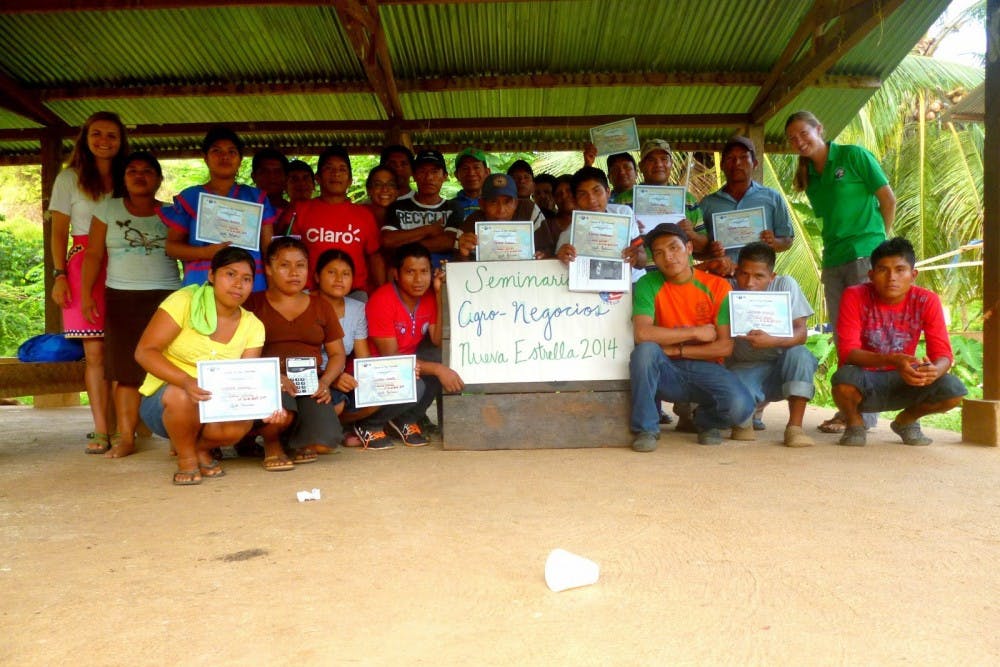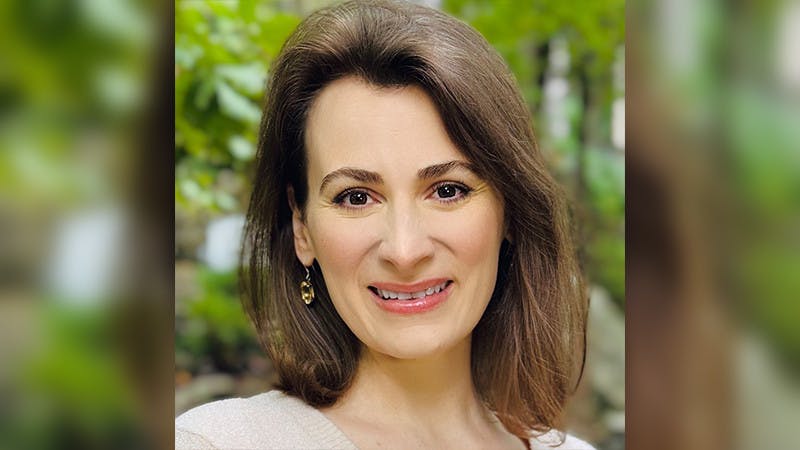
Lila Holzman, standing far right, is one of many Penn students who volunteer with the Peace Corps| Courtesy of Lila Holzman
Credit: PicasaUpon arriving home one afternoon to find a large yellow snake on her wall, Wharton MBA student Lila Holzman grabbed her machete and chopped its head clean off.
It was life as usual for Holzman, who was volunteering abroad in rural Panama with the Peace Corps. Run by the U.S. government, the Peace Corps is a volunteering organization that sends young people to developing countries overseas to expand cultural boundaries.
Holzman had always been interested in the intersection between environmental sciences and international development. She studied environmental engineering as an undergraduate at Rice University and worked for three years afterwards at a solar energy startup. She decided to join the Peace Corps after hearing about the experiences some of her co-workers had in the program.
Peace Corps sent her to rural Panama, where she lived in a completely different world than the she had been used to — no electricity, no running water and limited internet access. Holzman spoke Spanish every day with the villagers and engaged in various community-building tasks, from composting with locals to attending birthday parties. She learned from the ground up how to adjust to a new culture and community.
While Holzman had always been active in community service, not all Peace Corps members came from a background of volunteering. 2008 Engineering graduate Keith Mangam was on a very different path before he found the Peace Corps. A chemical engineer, Mangam was working as a management consultant in New York when his life took an unexpected turn.
“[I] visited a friend who was doing a language fellowship in Cairo my first year after Penn,” Mangam said. “Seeing him being completely fluent in Arabic and so well integrated into a foreign culture really made me understand how little I knew about the world, and how much I wanted to experience living abroad, helping people who are less fortunate.”
Mangam applied to the Peace Corps shortly thereafter and was sent to Burkina Faso, a country he hadn’t known even existed before his trip. Living in sweltering 110 degree weather for 26 months, he learned everything from speaking the local Jula language of his village to sharing “bush taxis” with chickens and sheep squeezed in around him for company.
“When you’re dropped off in that village and the car pulls away and you’re sitting in the hut all by yourself, you’re basically like an infant relearning how to walk, how to eat [and] how to talk to people. It’s completely different,” Mangam said. “It ended up changing my entire opinion of what I wanted to do with my life.”
After returning from his trip, Mangam changed his career path and attended graduate school to study developmental economics. Following graduation, Mangam completed a stint at the World Bank in Burkina Faso and currently works for a public policy and business research firm in D.C.
At Penn, where most students go on to work corporate jobs or attend professional schools after graduation, joining the Peace Corps can feel like going out on a limb. This, however, hasn’t deterred some current students interested in a career in community service from pursuing their goals.
Wharton junior Raina Searles is strongly considering joining the Peace Corps or a similar service opportunity after graduation.
“A lot of my friends in Wharton are going for banking or consulting internships, getting ready for OCR, and I’m kind of on this different path to service organizations,” Searles said. “But what I have found is that taking a step back allows me to find a lot of people who do share similar interests. It’s not necessarily that everyone is going a different way — it’s that you have to find people who are going the same way as you.”
But while Peace Corps may be the path less taken, it comes with its own unique set of challenges. Holzman recalled sometimes struggling with a “sense of loneliness,” being the only American for miles around. She also encountered some cultural shocks while in rural Panama. While Holzman's host father was years older than her, his wife, a mother of four, was younger than Holzman. Additionally, birth control was not widely available or used in the rural areas of Panama — some women in the village had as many as 12 children. Holzman remembers the locals being shocked to hear that she only had one sister.
Holzman and Mangam agree that the best thing is to enter Peace Corps without preformed expectations.
“Have more goals [instead], like what you want to learn from the experience and what you hope to bring in terms of support to the communities,” Mangam said.
“If you go in thinking you can solve the world’s most complicated problems quickly and easily, you will become jaded,” Holzman said. “There’s never a silver bullet to a complicated problem.”
Having approached her time in Panama with an open mind, Holzman came back armed with valuable experiences that fueled her interests in international development.
“I loved [my experience with Peace Corps] and I learned a lot,” she said. “The challenges were worth it.”
The Daily Pennsylvanian is an independent, student-run newspaper. Please consider making a donation to support the coverage that shapes the University. Your generosity ensures a future of strong journalism at Penn.
DonatePlease note All comments are eligible for publication in The Daily Pennsylvanian.







